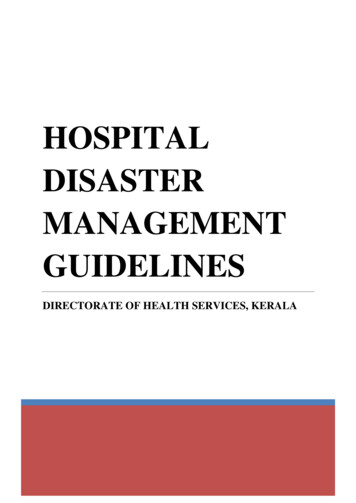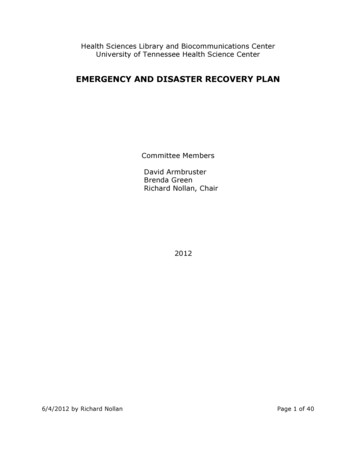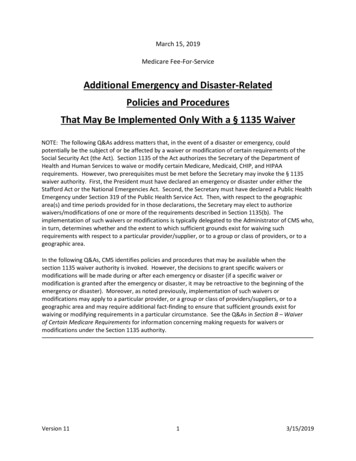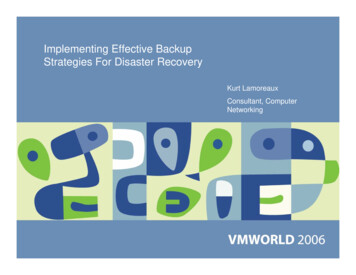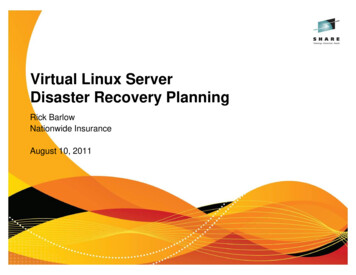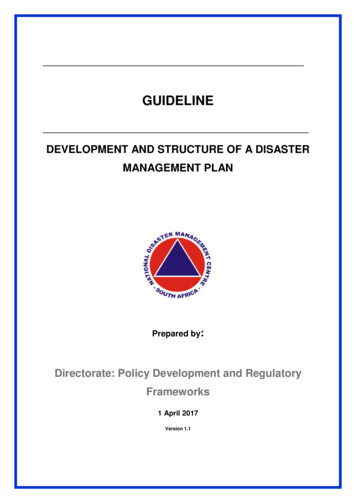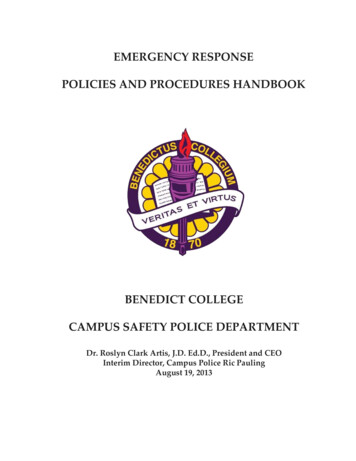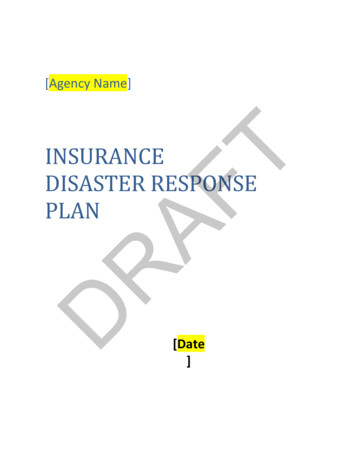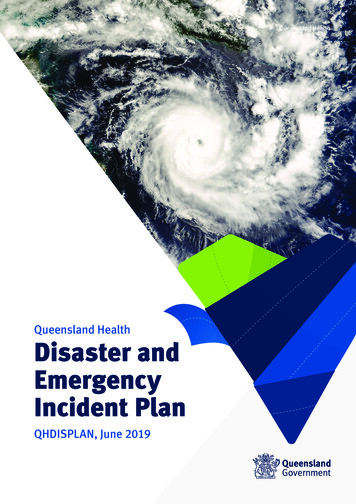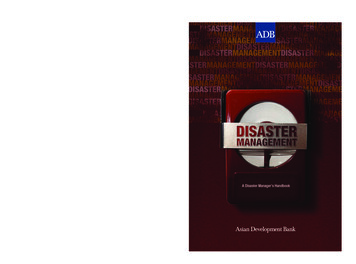
Transcription
Vol-4 Issue-6 2018IJARIIE-ISSN(O)-2395-4396Emergency Response & Disaster Managementfor Oil Refineries11Deepak GuruReference from : Indian Oil RefineryABSTRACTEmergency Planning is an essential part of the loss prevention strategy. This is a preplan to handle any emergencysituation effectively. Emergency planning is an integral part of the overall loss control program and is essential forany organization. The same is important for effective management of an accident /incident to minimize losses topeople and property, both in and around the facility. The important aspect in emergency management is to preventby technical and organizational measures, the unintentional escape and ignition of hazardous materials out of thefacility and minimize accidents and losses. Not only unrecognized hazardous conditions which could aggravate anemergency situation be discovered, the emergency planning process also brings to light deficiencies such as lack ofresources necessary for effective emergency response. Emergency planning also demonstrates the organization’scommitment to the safety of employees and increases the organization’s safety awareness.Keyword : - Emergency Management for Oil Refinery Emergency, Safe Handling of Hydrocarbons,Disaster Management in Oil Refineries, Strategy During Emergency Response1. Emergency Management for Oil Refineries:This study would be helpful for technological upgradation of effective emergency management & effectivecontainment of the situation by proper mitigating action at the place of occurrence, cautioning people in adjoiningaffected localities, prompt rescue and medical aid to affected persons and communication to civil authorities forrushing in help from outside. All concerned are hereby requested to carefully study and thoroughly familiarizethemselves with it, in order to ensure its effectiveness in times of emergency. It is essential that responders at thetime of disaster are fully informed on their respective roles and are properly trained in fields relevant to the potentialeffects of the accident. They should undertake routine rehearsals at periodic intervals.Eg1: As per, Petroleum & Natural Gas Regulatory Board that effective emergency management should be based onthe criticality of hazardous processes, affected people & available mitigation resources during catastrophic failure.Eg 2: It is reported that technological resources & competent management will reduce the impact of emergency.1.1 Technological Upgradation for Emergency EquipmentThere are many advanced technology upgraded in the emergency equipment but the effective utilization, expertise tooperate those equipment during emergency is very important. In India there are many fire reported in the oilrefineries, but still advanced upgraded technology like big flow water pump & monitors with firefighting media forfull surface tank fire are not recommended. Many refineries have more inventory of oil product but for protection &mitigation measure are missing due to lack of situational awareness.1.2 Competency for Emergency Handling:Emergency response team members should be thoroughly trained for potential crises and physically capable ofcarrying out their duties. Team members need to know about toxic hazards in the workplace and be able to judgewhen to evacuate personnel or when to rely on outside help (e.g., when a fire is too large to handle). One or moreteams must be trained in: Use of various types of fire extinguishers.9302www.ijariie.com266
Vol-4 Issue-6 2018IJARIIE-ISSN(O)-2395-4396 First aid, including cardiopulmonary resuscitation (CPR) and self-contained breathing apparatus (SCBA). Requirements of the OSHA bloodborne pathogens standard. Shutdown procedures. Chemical spill control procedures. Search and emergency rescue procedures. Hazardous materials emergency response.2. Safe Handling of HydrocarbonsTo handle hydrocarbons is a big challenge to the oil refineries. Probability of a problem, such as refrige safety canbe managed very well, as long as service technicians follow their training and the rules for handling hydrocarbons.Safety can also be ensured by conducting regular risk assessments, creating safe zones free of ignition sources,ensuring the presence of fire extinguishers and monitoring the area with hydrocarbon detectors.Flammable Liquids Storage, Chemical Safety. Hazardous chemicals can destroy health, cause severe injury, harmthe environment and damage property. Training on the safe handling of chemicals is key for any teams who workwith, supply, or store hazardous materials.Graph indicates the maximum accident reported in 2017-18 due to mishandling of the hazardous chemicals.Chart -1: Hazardous Chemical Accident AnalysisAdvanced featured floating roof tanks for storage of volatile hydrocarbons to avoid fire & explosion due toformation of vapor space.9302www.ijariie.com267
Vol-4 Issue-6 2018IJARIIE-ISSN(O)-2395-4396Fig.-1: Safety Features for Floating Roof Petroleum Storage Tank2.1 Containment of Hazardous Chemicals: Develop procedures for working with hydrocarbons and follow them on every job, keeping in mind theflammable nature of these refrigerants.Because hydrocarbon refrigerants do not have an odorant, a quality combustible gas leak detector ismandatory for service work.Pass the combustible gas detector through every work site you enter.Ensure there is a fire protection as per the inventory of hydrocarbons.Table -1Petroleum ProductsFurnace oil, High viscous oilNaphtha, GasolineVacuum Gas OilLPG Gas, Hydrogen GasIsomer productsRecommended Storage TankFixed Roof TankExternal Roof Storage TankInternal Storage TankSpheresDome Roof Tank2.2 Handling of Petroleum ProductsMany common household products contain chemicals that can cause injury or death if they are not handled,stored, or used properly. Some of the household products that contain hazardous chemicals are ovencleaners, tile cleaners, toilet-bowl cleaners, liquid drain openers, antifreeze, chrome-wheel cleaners, rustremovers, gasoline, motor oil, lead paint, turpentine, lacquer thinner, and muriatic acid. 9302Storage Tank for Flammable Liquid - 1Storage tanks for Toxic chemicals - 2Spheres for Flammable Gases- 3FRP tanks for Acidic storage chemicals- 4www.ijariie.com268
Vol-4 Issue-6 2018IJARIIE-ISSN(O)-2395-43963. Disaster Management Plan:Emergency planning is very essential tool during catastrophic failure, which needs to localize any accidents that mayoccur and, Its main objective is to reduce the probability of serious loss / damage to people, machinery, equipment,important documents, etc. The loss can be measured in terms of both human and monetary. If the effective action istaken in time, the full potential loss can be avoided. The action can be effective only when there is an existence ofpreplanned and practiced procedure for handling major emergencies utilizing the combined resources of the industryand outside services like Government Agencies, Fire Brigade, Medical, Police, Mutual aid members, etc.Thus “Emergency Response and Disaster Management Plan” (ERDP) is prepared with the objective of defining thefunctions and responsibilities of all concerned – Operations, Maintenance and Support Services DepartmentPersonnel with respect to detection of possible emergencies and effective implementation of the action plan.Chart -2: Oil Refineries Incident : Disaster Incident Chart3.1 : Emergency Strategy PlanningAn emergency management plan is a course of action developed to mitigate the damage of potentialevents that could endanger an organization's ability to function. Such a plan should include measures thatprovide for the safety of personnel and, if possible, property and facilities.Fig -2: Emergency Response Strategy9302www.ijariie.com269
Vol-4 Issue-6 2018IJARIIE-ISSN(O)-2395-43964. CONCLUSIONSSafe design and operation of installations with advanced technological upgradation are basic obligations. I haveemphasized more on technological upgradation of emergency resources for specifically full surface tank fire of oilrefineries & strategic approach during emergency. Management and staff must have expertise to deal oil refineryemergencies to protect human life and health, and the environment. The oil industry processes, stores and distributeslarge quantities of flammable materials, including gasoline which is classified as highly flammable, and liquefiedpetroleum gases are very hazardous & proper strategy with technical expertise based on the international standardlike NFPA11, API2021 essential.5. REFERENCES[1]. Refinery Manual[2]. OISD Data[3]. PNGRB 20139302www.ijariie.com270
for Oil Refineries 1Deepak Guru 1 Reference from : Indian Oil Refinery ABSTRACT Emergency Planning is an essential part of the loss prevention strategy. This is a preplan to handle any emergency situation effectively. Emergency planning is an integral part of the overall loss control program and is essential for any organization.
